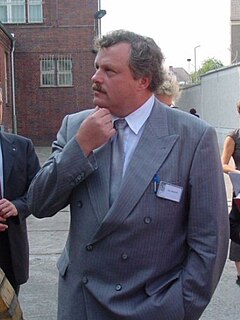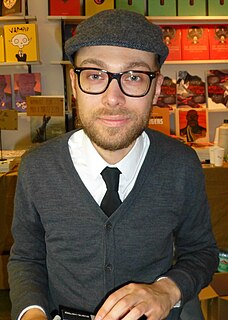
Heilbad Heiligenstadt is a spa town in Thuringia, Germany. It is the capital of the Eichsfeld district.

Hans Mommsen was a German historian, known for his studies in German social history, and for his functionalist interpretation of the Third Reich, especially for arguing that Adolf Hitler was a weak dictator. Descended from Nobel Prizewinning historian Theodor Mommsen, he was a member of the Social Democratic Party of Germany.

Kölleda is a town in the district of Sömmerda, in Thuringia, Germany. It is situated 10 km east of Sömmerda, and north of Weimar. The former municipality Beichlingen was merged into Kölleda in January 2019.

The Iron Front was a German paramilitary organization in the Weimar Republic that consisted of social democrats, trade unionists, and liberals. Its main goal was to defend liberal democracy against totalitarian ideologies on the far right and left, and it chiefly opposed the Sturmabteilung (SA) wing of the Nazi Party and the Antifaschistische Aktion wing of the Communist Party of Germany.
The Stasi Records Agency (Stasi-Unterlagen-Behörde) is the organisation that administers the archives of Ministry of State Security (Stasi) of the former German Democratic Republic. It is a government agency of the Federal Republic of Germany. It was established when the Stasi Records Act came into force on 29 December 1991. It is formally called the Federal Commissioner for the Records of the State Security Service of the former German Democratic Republic ; in German it is commonly known by the abbreviation BStU.

Hans-Joachim Veen is a German political scientist. He is the former Director of Research at the Konrad Adenauer Foundation, head of the scientific advisory committee to the Stasi Records Agency, and an honorary professor at the University of Trier.
Joachim Werneburg is a German writer who publishes lyric-epic texts and short prose.

Wenzel Jaksch was a Sudeten German Social Democrat politician and the President of the Federation of Expellees in 1964 to 1966.

Siegfried Reiprich is a German human rights activist and author. He was involved in the resistance against the communist regime of the German Democratic Republic (GDR), which led to him being expelled from university and eventually banished from the GDR. In 2009, he was appointed by the Government of Saxony as the Director of the Stiftung Sächsische Gedenkstätten. In 2011, he was elected as a member of the Executive Board of the Platform of European Memory and Conscience.

Schloss Weimar is a Schloss (palace) in Weimar, Thuringia, Germany. It is now called Stadtschloss to distinguish it from other palaces in and around Weimar. It was the residence of the dukes of Saxe-Weimar and Eisenach, and has also been called Residenzschloss. Names in English include Palace at Weimar, Grand Ducal Palace, City Palace and City Castle. The building is located at the north end of the town's park along the Ilm river, Park an der Ilm. It forms part of the World Heritage Site "Classical Weimar".
Ilko-Sascha Kowalczuk is a German historian and author. His work is focused on the German Democratic Republic and its Ministry for State Security.
Ehrhart Neubert is a retired German Evangelical minister and theologian.
Peter Maser is a German protestant church historian.

"Von guten Mächten" is a Christian poem which Dietrich Bonhoeffer wrote in 1944 when he was in a Gestapo prison because of his resistance to the Nazis. It is his last theological text before he was executed on 9 April 1945. It became a frequently sung hymn, with different melodies, which has appeared in current German hymnals. The incipit is Von guten Mächten treu und still umgeben. The seventh and last stanza, Von guten Mächten wunderbar geborgen, has been used as a refrain in a popular version.

Siegfried Rudolf Geißler was a German composer, conductor, hornist and politician. He founded the Thüringen Philharmonie Suhl in 1979. After the Wende, he was a member of the New Forum who was elected to the first Landtag of Thuringia in 1990. As its senior, he was its Father of the House and opened the inaugural session.

The Memorial and Education Centre Andreasstraße, is a museum in Erfurt, Germany, which is housed in a former prison used by the East German Ministry for State Security (Stasi). It is informally known as the Stasi Museum.

Simon Schwartz is a German illustrator, comic writer and cartoonist. His work is published in the Frankfurter Allgemeine Sonntagszeitung, Die Zeit and other newspapers and magazines. He has written graphic novels including "drüben!" and "Packeis" and his work has been translated into French and English.
Ulrich Pfeil is a German historian based in France.












